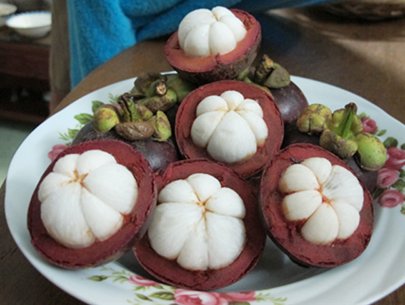
Mangosteen (Garcinia mangostana), called măng cụt in Vietnamese, is grown throughout the country for its sweet and tasty fruits. The fruit has long been used to prepare several kinds of drugs. Given its precious properties, mangosteen is nicknamed the “queen of the fruits” in Australia.
 |
| Mangosteen is dubbed the "qeen of the fruits" thanks to its precious properties |
In traditional Vietnamese medicine, mangosteen is used to treat diarrhea, heal external wounds and cure skin illnesses. The rind of the fruit is also used as a remedy for many illnesses thanks to its abundant xanthones, a polyphenol. There are about 40 kinds of xanthones found in mangosteen, especially in its rind.
Studies show that xanthone is a strong antioxidant that can help prevent the attack of fungi and bacteria. It can also strengthen the immune system and inhibit the formation of low-density lipoprotein (LDL) cholesterol, which is considered as “bad” cholesterol, in the blood. It is also used to relieve pain, fever, inflammation and allergy.
U.S. scientists have discovered that intake of mangosteen, with its high concentration of xanthones, can help relieve tiredness. The fruit can also help intensify the blood vessels and facilitate the blood circulation, thus reducing the risk of high blood pressure and cardiovascular diseases.
The xanthone in mangosteen can kill bacteria in the stomach and thus help prevent stomachache, diarrhea and burp. As it is an antibacterial as well as an antiallergic substance, xanthone can help relieve asthma.
Intake of mangosteen is recommended for those suffering from diabetes. It is because the anti-inflammatory property of xanthones in the fruit can help lower and regulate the blood sugar without the use of diabetes-fighting drugs.
Xanthones can help protect liver cells and inhibit the formation of cancerous cells, thus preventing certain cancer. Studies prove that intake of mangosteen juice can partly help prevent the risks of blood, breast, liver, stomach and lung cancers.
Mangosteen is rich in antioxidants which are believed to be stronger than vitamins C and E in fighting the aging process. The fruit is therefore considered a potential in preventing Parkinson’s disease and Alzheimer’s disease.
Using mangosteen juice as an antihistamine to fight allergies and inflammations is a good choice as it is tasty and does not cause drowsiness, an unexpected side effect that is often seen in many antiallergic drugs.
Mangosteen also has tryptophan, which can boost the formation of serotonin during the metabolism process. Serotonin is active in stimulating human emotions, appetite and sleep.
Eating mangosteen flesh or washing the mouth with mangosteen fruit juice after a meal can help refresh the breath and prevent halitosis.
External illnesses such as eczema, acne and itching can be cured by washing the affected areas with mangosteen juice a few times a day.
(Source: SGT)




